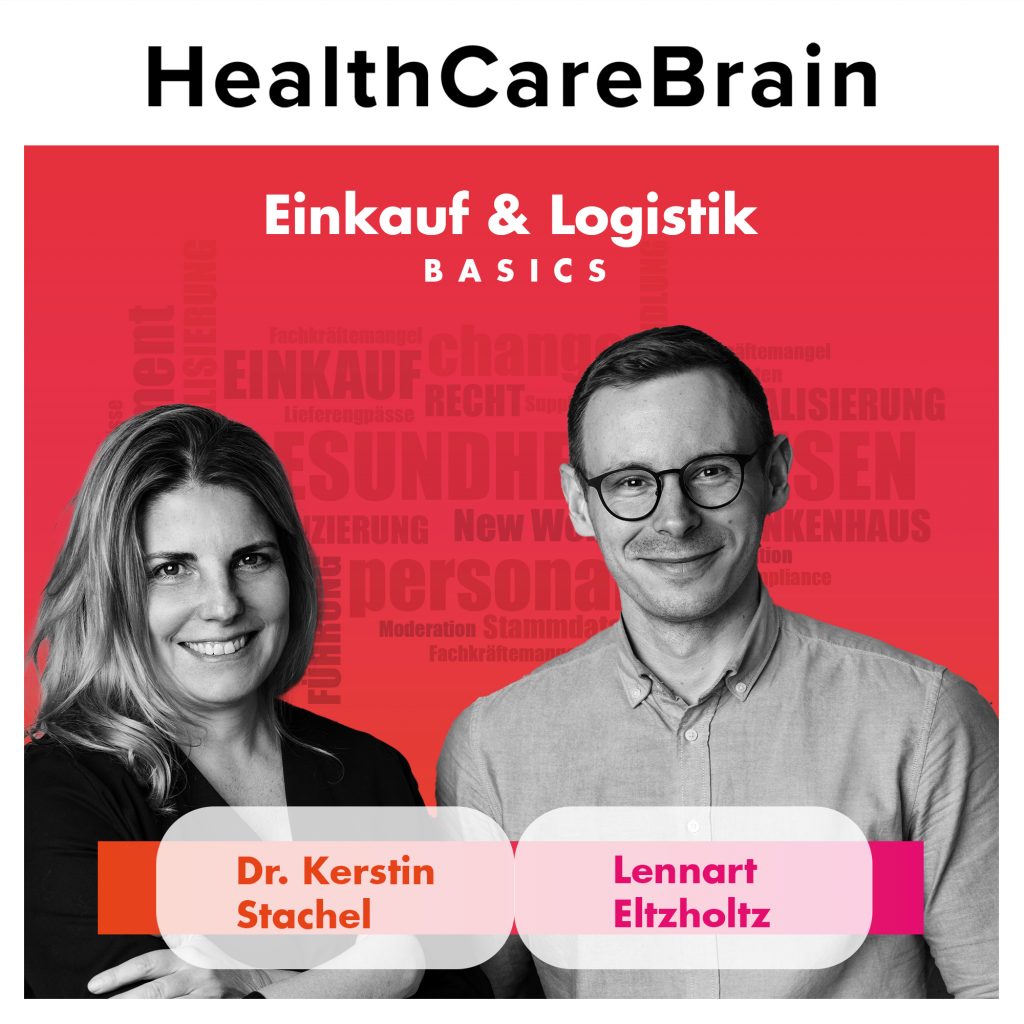
Playful teaching of the basics of purchasing, logistics, healthcare and much more!
Topics: Negotiations, financing, leadership, change management …
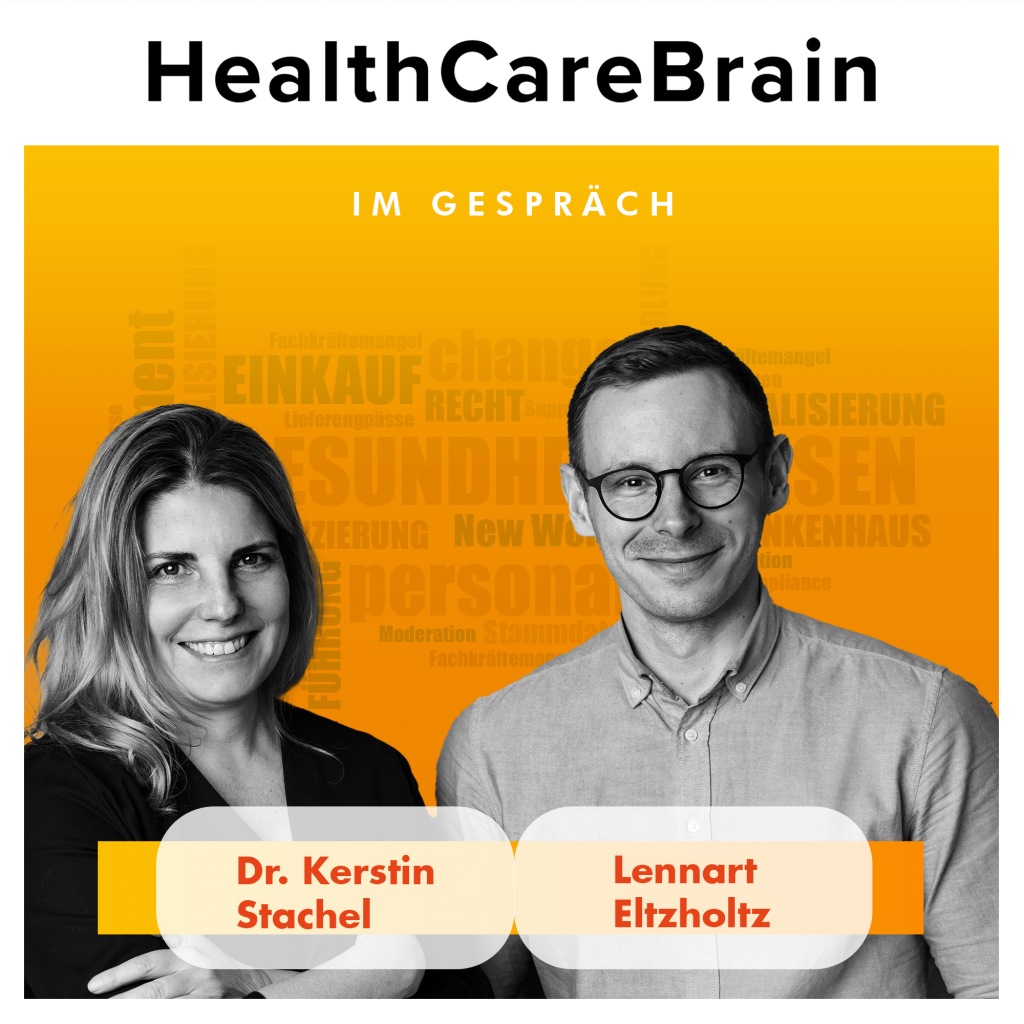
Exciting discussions with experts from purchasing, logistics & management
Guests: Jonah Grütters, Dr. Clemens Jüttner, Laura Wamprecht and many more!
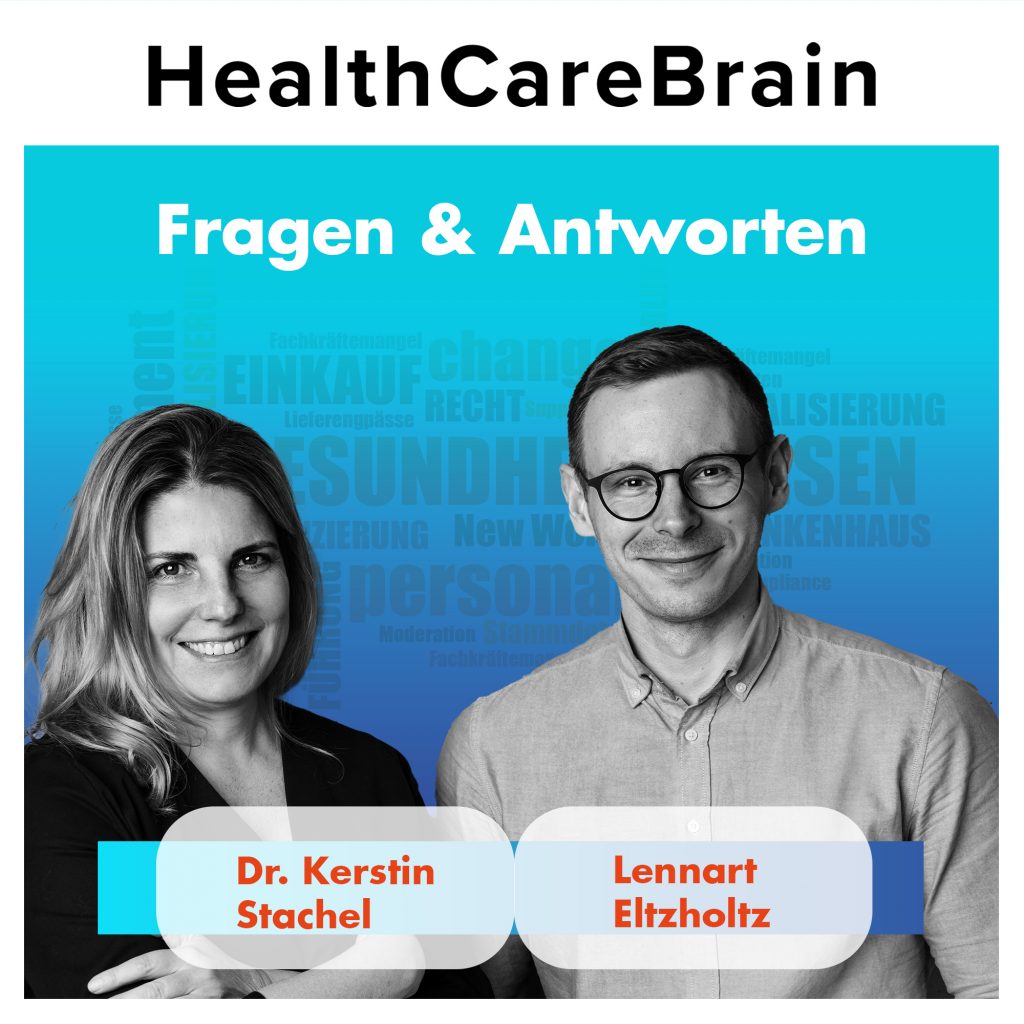
Your questions our answers. We regularly answer questions from our listeners
What questions does nursing care have? Which young professionals? Which one do you have?

Information on the individual episodes
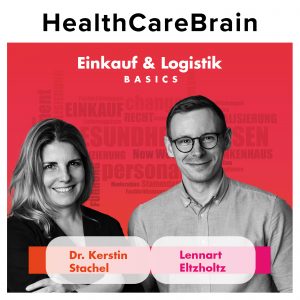
Do you want to create a professional purchase department? Do you work strategically? We’ll show you how it’s done. In the first episode, we present the 10 building blocks it takes to build a professional hospital purchasing department.
The most important contents at a glance:
- Understand and master legal framework of own hospital.
- Attract qualified employees for purchasing and invest in training and promotion.
- Ensure efficient processes with good master data and trained handling of relevant IT systems.
- Establish purchasing guidelines to consistently eliminate maverick buying.
- Question and adapt the organization of the purchasing department depending on the degree of maturity.
- Standardization not only of products, but also of processes.
- Achieve bundling effects and improved prices for medical technology with investment planning and established investment commission.
- Structured project organization and close involvement of nursing staff and physicians as decisive success factors for purchasing projects.
- Membership in purchasing pools enables better conditions through bundling effects, but membership in a purchasing pool should not be used to reduce internal resources.
- Close cooperation with medicine & nursing should become routine. To this end, an open and transparent exchange between purchasing and users is crucial.
The bonus material for the first episode:
We hope you enjoy listening and look forward to your feedback!
Your life consists of negotiations. Not only in purchasing!
🤔 How do you stay objective even when emotions are running high?
🤠 What influence do the personality types of your negotiating partners have on you?
😰 How do you ask correctly?
😉 How do you find a compromise even in difficult situations?
🤼 Who sits at the negotiating table?
…..
Listen in. We share our experience and explain how we conduct negotiations.
😉 🙃 Whoever listens to the episode in full will win every negotiation with us! Really? Let’s see what the future brings. 🙃 😉
The bonus material for the second episode: Coming soon.
We hope you enjoy listening and look forward to your feedback!
We are especially proud of our first podcast episode with a guest.
By now, we have become accustomed to the fact that supply bottlenecks are part of everyday life. A challenge for a hospital.
In our episode 3 of the HealthCareBrain Podcast, you’ll learn:
💡 How supply bottlenecks occur,
💡What you can do preventively and
💡How to behave when a supply bottleneck actually occurs.
What is the situation with pharmaceuticals? Meanwhile, more than 500 drugs are missing [Quelle BfArM]. Among them, critical ones such as antibiotics. Unimaginable? No, unfortunately sad reality. And the situation in Switzerland is no better. Enea Martinelli regularly points this out on linked.in.
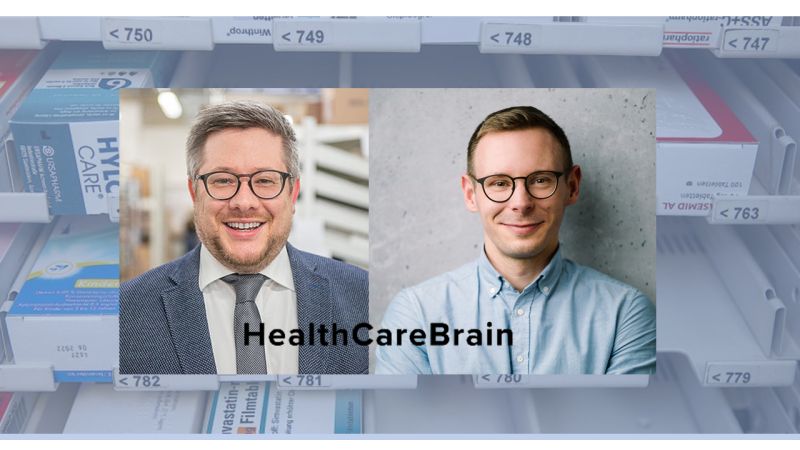
Our guest Dr. Florian Immekus explains in a lively and practical way what this means for a hospital, how these supply bottlenecks arise and what a hospital, but above all politicians, must do.
Dr. Florian Immekus is pharmacy director at Mühlenkreiskliniken in Minden.
The healthcare system is complex. We’re probably not telling you anything new. But what we can tell you is how to gain access to such a magical organization as the hospital. What does it mean to work in an expert organization? What distinguishes the provision of a service from a production company? Who are the key stakeholders in the hospital? Carrier type & supply level – what influence do they have on the purchasing strategy?
Find out! In this episode, we provide the basics to understand how a hospital works. We’ll leave the topic of financing out of it (for now), as there will be a separate episode on this.
You can delve deeper into the content of the podcast episode with our practical book “Supply it”: https://healthcarebrain.eu/category/buchinhalt/
We have also created a knowledge bite for you. You can find it here .
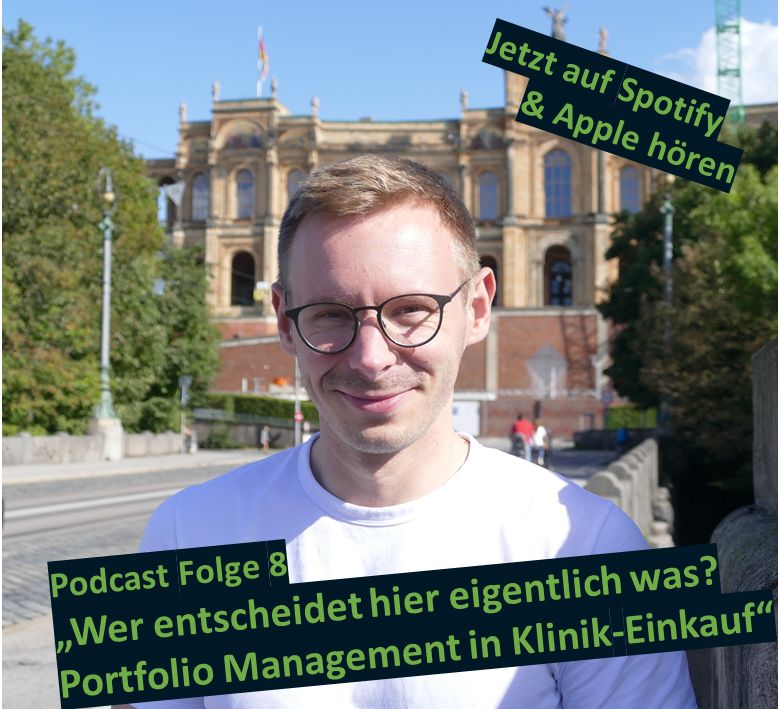
In episode 8 “Who actually decides what? – Portfolio management in hospital purchasing” , we discuss how negotiations are planned and how to ensure that all product groups are given sufficient consideration. What matters here is a comprehensible system and the question of how binding decisions on the use of products are made.
It is essential to gain the trust of the medical and nursing staff.
First of all: developing a negotiation strategy is no easy task, because a hospital with 1,000 beds has around 50,000 items in the medical products area alone and purchases these from 800 to 1,000 suppliers.
Traditionally, the purchasing department carries out an ABC analysis and negotiates with the suppliers with the highest turnover. This then leads to smaller suppliers and product groups falling by the wayside due to time constraints. Then a consulting firm comes along and launches the “Non-negotiated suppliers” project. These projects are generally not sustainable because the many simultaneous product changes unsettle doctors and nursing staff and reduce acceptance within the hospital.
Thinking in terms of portfolios has proven its worth. You ask yourself: What does the doctor need to perform dialysis, for example? Then you combine all medical products, devices and, if necessary, medicines in a portfolio. This has the advantage that you enter the trial from a medical perspective. You focus on what care, medicine and the patient need. Then you can bundle the products with one supplier and understand what is important for the individual portfolios as a whole and in context. On this basis, you or your purchasing group determine how often and with which terms you negotiate. If a portfolio is very innovative, you should negotiate the conditions annually; for less innovative portfolios, you can negotiate much less frequently and conclude long-term framework agreements (as far as the current market allows).
Our tip: Take a look at the results of the BVMed fall survey. There, the industry itself assesses how innovative the products of different medical specialties are. Of course, this assessment does not necessarily have to be the same as your doctor’s assessment. Discuss openly with doctors and nursing staff why you want to proceed as you do. People will only trust you if your decisions are comprehensible.
In the next step, you decide who gets to decide which product to buy. Purchasing based on quality and cost-effectiveness without testing, or doctors, because only they know which product is suitable for patients?
In the “Supply it” practice guide, we have divided the products into simple, specialized and medically necessary. We are not yet completely satisfied with these designations, because every product can be medically decisive, especially if it is missing…
Our basic idea: products that can be objectively described using standards or are of the same quality are classified as “simple” and the purchasing department decides which product is used. One example would be the examination glove.
It sounds simple, but it is not, because it only works if there is a lasting relationship of trust between purchasing, medicine and care. You have to earn this by showing that you are able to procure high-quality products and that product changes can only be made with a sense of proportion and good communication. Remember: almost every new product brings new uncertainties and therefore unrest, so if you change something, it really has to be worth it.
Your aim should be to have enough time to concentrate on the really medically important products such as defibrillators, pacemakers, implants or the topic of laboratories.
Our most important recommendation: Never proceed with the crowbar, i.e. according to the motto: This has to be done now, this is the cheapest product on the market. But rather develop scenarios: What are the benefits of bundling with one provider? What are the benefits of changing products? Obtain benchmarks from other companies and always obtain a mandate from the management so that everyone is clear: Purchasing is allowed to deal with sensitive issues and it is desirable that everyone works together to find the best economic and medical alternative.
Remember: trust has to be earned and once you have it, it is a delicate little plant that needs to be carefully nurtured and cared for.
A buyer has to be an all-rounder, the logistician a magician.
It is clear that there are hardly any such people in practice! This makes it all the more important to know what skills are needed to be successful.
🎧 What can you expect?
– Find out what skills buyers and logisticians need to keep supply chains running while ensuring patient care.
– Insights into the magic of logistics, where creative minds master the unexpected every day.
– Tips and experiences from us on how to find and train the right people in the healthcare sector
Last year, episode 5 on the basics of the hospital world went down really well with you. Now there is finally the long-awaited part 2.
The healthcare system is complex. We’re probably not telling you anything new! But what we can tell you is how to gain access to such a magical organization as the hospital.
In Part 1, we dealt with questions such as:
❔ What does it mean to work in an expert organization?
❔What distinguishes the provision of a service from a production company?
❔Who are the important interest groups in the hospital? Carrier type & supply level – what influence do they have on the purchasing strategy?
📌 Haven’t heard part 1 yet? Then catch up as quickly as possible!
Part 2 is all about one thing: money.
🔦 How is the German healthcare system financed?
🔦 What does dual financing mean?
🔦 Outpatient before inpatient – but does it work?
🔦 What is a DRG, a ZE or a NUB?
With the hospital reform announced by the Federal Ministry of Health, the Karl Lauterbach has also announced major changes to the financing of inpatient services.
❓ Are we going back to the cost recovery system?
❓Where does the reform start in terms of change?
❓What is our opinion on the announced reform plans?
Find out! In this episode, we provide the basics to understand how a hospital finances itself.
What is it like to take on management responsibility in healthcare, hospitals, purchasing and logistics at a young age? Kerstin and Lennart talk about this in this podcast episode. Both Kerstin and Lennart took on management roles at Bonn University Hospital at a young age. They talk about their experiences, share one or two anecdotes and give tips for young professionals who are in or want to take on management responsibility.
Working Capital Management – bulky title…but wait! In times of scarce investment funds and declining liquidity, the instruments of working capital management in hospitals are helpful and, above all, can be implemented directly. Lennart talked to our guest Mathias Schönfeld (Senior Consultant at Sana Purchasing & Logistics) about the concept, the objectives and the practical application in hospitals. Find out why cash discount is not always the best answer!
In this episode, Johannes Müer (Business Development Manager at Sana Purchasing & Logistics) and Kerstin talk about the basics of full hospital care. How do the products get from the order to the patient via logistics? Which products come from a warehouse? Which ones directly from the supplier? Which IT systems are used? Look forward to a comprehensive insight into the world of hospital logistics.

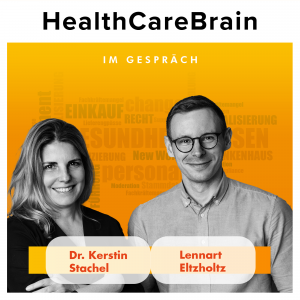
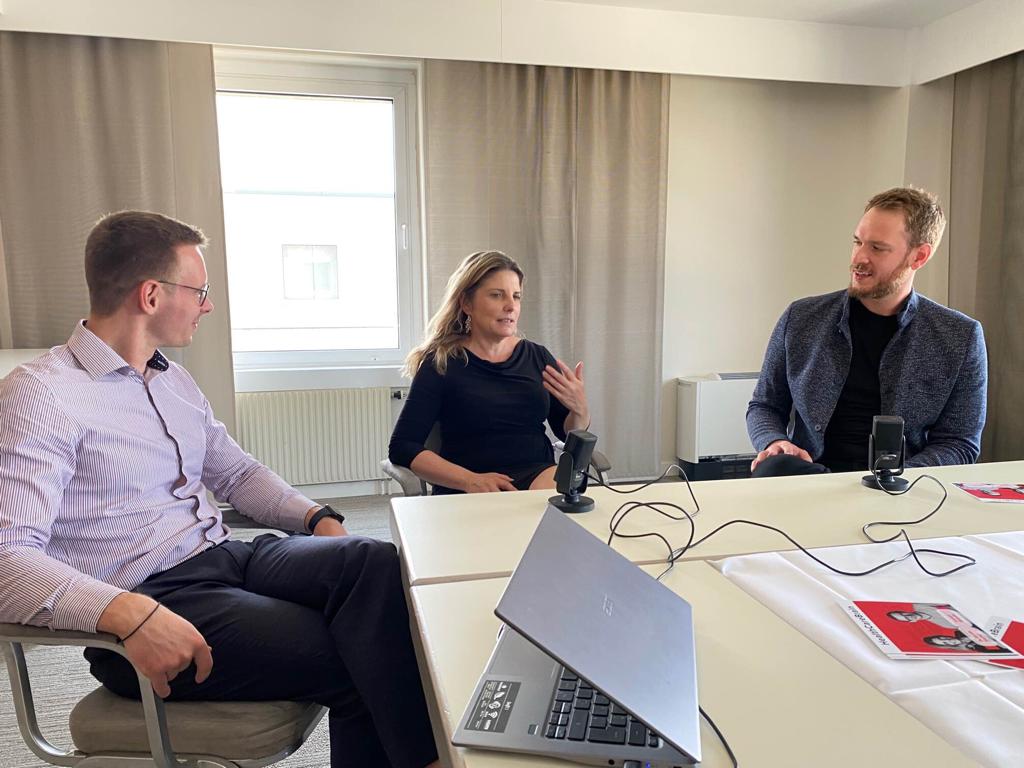
How fortunate that two podcasts at once have teamed up to reflect on Sana DIALOGUE 2023.
Look forward to a collaboration episode from Healthcare out of the box and HealthCareBrain. Tobias Krick, Kerstin Stachel and Lennart Eltzholtz review DIALOG 2023.
We talk about the importance of digitalization, AI, open source technology and prevention in healthcare. We discuss New Work and the absolute necessity of intergenerational collaboration and that work should be enjoyable and fulfilling regardless of age.
The discussion about hospital reform is still open-ended, and a real sense of optimism is still a long way off. Added to this are global political developments and (de)globalization. Purchasing is the driver and shaper of globalization. Managers and buyers need to adapt, anticipate the future and actively shape markets.
Fascinated, we review the dialogue about morality and money. Unfortunately, of course, many questions remain unanswered, a world of uncertainty, but we will break with tradition and think out-of-the-box.
Have fun listening. We look forward to your feedback.
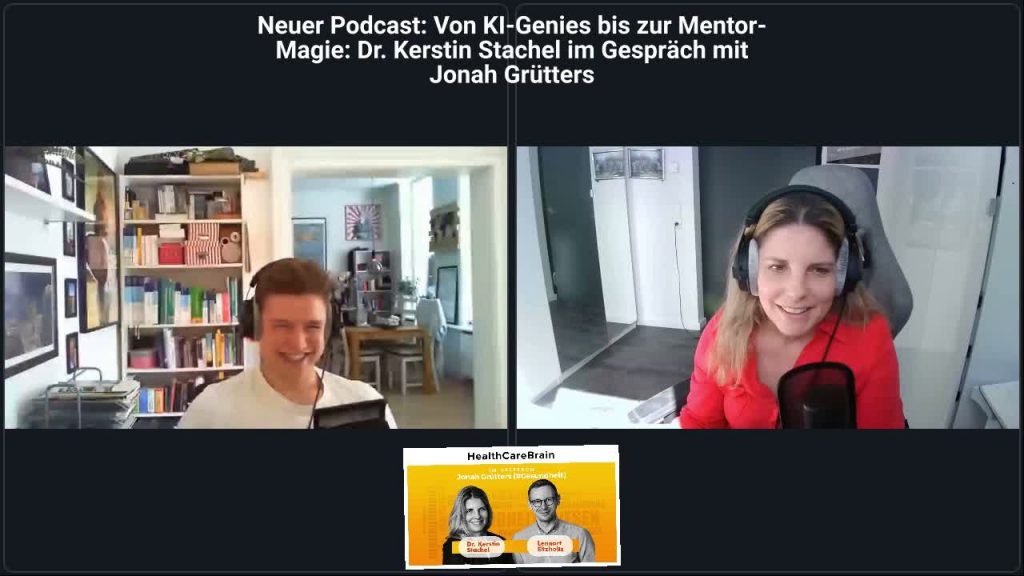
In our new podcast episode of #HealthCareBrain, two generations from the healthcare sector meet and give exclusive insights into what drives them in their daily work. Kerstin and Jonah take a deep dive into past and future changes in the world of work and reveal their views
✍ on the disruptive power of AI,
✍ What makes a good mentor
✍ and what the future holds for the younger generation.
Jonah is 25 years old and discovered his passion for healthcare at an early age. Shortly before completing his degree in health management, he is not only at the start of his career, but is also actively involved in Hashtag Gesundheit e.V..
Kerstin is 48 years old and began her career in industry, but fate unexpectedly led her into the world of healthcare. She has held various management positions in hospitals for more than two decades and has passed on her knowledge in numerous books on hospital management.
In this interview, we want to know more about her:
👉 Where does the healthcare system stand today?
👉 What fresh ideas does the industry need and what does appreciation have to do with it?
👉 How do the perspectives of the generations differ and what does it take to bring them together?
You can look forward to a thought-provoking conversation that will bring fresh ideas.
You can deepen and review the content of the podcast episodes with our practical book “Supply it”.
You have questions about our podcast episodes? We will start soon with a Q&A episode. ✉ Feel free to send us a voicemessage with your question to info@healthcarebrain.eu
Did you like the episode? Then support us with a star rating ⭐⭐⭐⭐ in the Spotify app or on Apple Podcast and activate the bell🔔 so you don’t miss an episode
Have fun listening, Kerstin & Lennart
Lennart Eltzholtz in an interview with Laura Wamprecht. It’s about innovation and, above all, how AI is changing healthcare and our lives. We talk about opportunities and risks and, of course, how AI can help us with the skills shortage and make our lives easier. Laura Wamprecht is Managing Director of Flying Health. Flying Health is an innovation consultancy and an innovation network that primarily supports start-ups and brings companies into contact with each other. She supports companies in the early start-up phase and is therefore very familiar with regulatory issues and ideas for the healthcare of tomorrow.
The most important contents at a glance:
AI has been around for a long time, but has not yet reached the masses. Thanks to Chat GPT, AI has now reached the masses and is also being used. The usability is now such that AI can be used easily. As a result, AI is currently turning a wide variety of industries, the creative industries, schools and universities upside down: Suddenly we have to ask ourselves: What is a self-written text still worth? How do I find out if someone wrote something themselves or if it was just AI?
Companies must adapt to the fact that they will have to do marketing and sales differently. When traditional search engines are replaced by AI models, the question is: How do I get the BOT to put me in the top 5 results?
Which hospital does the AI suggest when I ask where is the best place to have my hip operated on?
It is pleasing that the legislator has understood that health data is an opportunity and not a risk. The law on the use of health data is on its way. This means: Firstly, all SHI data is to be collected in a research data center. Secondly, the statutory health insurance funds are to be given the right to evaluate the data and write to the insured individually on the basis of these findings in order to give them advice or draw their attention to health risks. The electronic patient file should be better utilized. The way there? We want to move from the opt-out procedure to the opt-in procedure, which means that citizens must actively say: I don’t want an electronic patient record. He currently has to actively apply for it in a complicated procedure.
At the same time, the Hospital Future Act, for example, is doing a lot to ensure that the new normal in hospitals is paperless and digital. The result: more and more structured and recorded health data, which can then of course also be systematically analyzed.
How important is data protection? What does the population think?
Conclusion: The opportunities are greater than the risks and completely new business models will emerge. It will be possible to personalize medicine even better. The larger the volume of data that can be analyzed in a structured way, the more knowledge can be gained and the better the forecasts and diagnoses are likely to be.
The thesis: We will not be able to avoid the support of AI in diagnostics in the future.
Why? Firstly, the shortage of specialists will make it even more difficult to get an appointment with a doctor. AI can help to bridge waiting times, make initial assessments, etc.
Doctors are only human and their decisions are subject to subjective perceptions. A digital second opinion can help to make decisions more objectively and provide meta-feedback.
Our opinion: AI will improve diagnostics.
The biggest challenge: we have to learn to work actively with AI and make responsible decisions together with AI.
The dangers from our point of view? Machines cannot reflect on their own learning.
Regardless of the bot, it reflects the opinions and attitudes of the population and also incorporates discriminatory and sexist elements into its algorithm. How can we manage AI learning ethically and responsibly?
AI can already do a lot of work for us today: Summarizing texts, taking minutes of meetings and this will only get better and better. What do we do with the time we have saved? Are we using them sensibly or will the workload increase even more? Our thesis: In times of a shortage of skilled workers, there is no way around it and, like all technical innovations, people will gradually integrate AI into their everyday lives and at some point it will become part of everyday life.
And of course we’ll also tell you which AI we use and what our personal concerns are. We hope you enjoy reading it.
Lennart Eltzholtz talks to Fiona Walter and Clemens Jüttner on the challenges of developing, prioritizing and implementing sustainability measures in the healthcare sector.
🌡 One thing is clear: sustainability is far more than just a trendy topic or a flash in the pan. We feel the effects of the often irresponsible use of resources every day!
❗ This is why sustainability is rightly a topic on the political agenda. This is also increasingly true for hospitals.
Sustainability is an issue that the hospital management must address.
⛓ The greatest potential? The supply chain. ⛓
The legislator has also recognized this. Hospitals must implement the Supply Chain Due Diligence Act. The Corporate Sustainability Reporting Directive introduces new regulations.
In this podcast episode, we talk about how sustainability becomes a real added value in hospitals and how a hashtag#sustainability strategy can be derived from all the measures.
In our HealthCareBrain podcast episode 19, we talk straight about purchasing, negotiation, price increases and the generation gap
in purchasing.
Our guest on the podcast was Christian Seidel.
Like us, Christian Seidel is passionate about purchasing. He has been a negotiation trainer for a wide variety of purchasing departments in all kinds of industries and countries for over 25 years. As editor-in-chief of the purchasing manager information service, he informs purchasing experts on a monthly basis about: Raw material developments, purchasing trends and negotiation techniques.
I had a great conversation with Mr. Seidel and we couldn’t find an end to it.
From the current market situation, his valuable insights into how purchasing departments worldwide should now position themselves in negotiations, the generational change in purchasing and how to negotiate with monopolists.
You can find out more about Christian Seidel and Purchasing Manager
here:
https://www.einkaufsmanager.net/lp/
https://csei-consulting.de/

📊 We conducted a survey for the 5th Ulm Care Management Congress. 70 people took part. The results were shocking!
When asked how the cooperation between purchasing and nursing works, 48% of the participants responded that it could be improved or was inadequate. The larger the clinic, the worse the cooperation was rated. The survey also asked a number of open questions, which we answer in this podcast episode.
In Wissensbiss 11 you will find a short summary of all questions and answers.
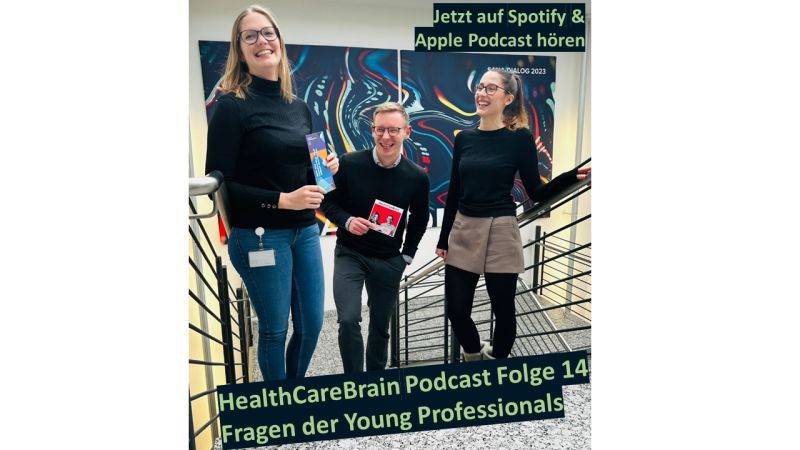
In this episode, we focus on questions from young professionals. Laura Ziegler was a guest on our podcast and had a few questions for us! Laura launched the Young Professionals network at Sana Purchasing & Logistics in 2021. The aim of the network is to bring young people together digitally once a week to exchange experiences and knowledge and to learn from each other. We are delighted that the network also discusses our podcast at regular intervals 🙂
This naturally leads to questions such as: “What has been the most challenging negotiation situation for Kerstin and Lennart so far and how have they mastered it?”
You have your own questions, which we will answer in an episode
should? Then send us your question as a voicemessage to info@healthcarebrain.eu
“Hospital reform is back on track.”
Federal Health Minister Karl Lauterbach said on January 30, 2024. He continued: “These two reforms are existential – both for patients and for hospitals.” He was referring to the Transparency Act and the hospital reform.
Meanwhile, the KMA headlines: Transparency law causes anger The DKG “appeals to the federal states not to approve the transparency law if Lauterbach continues to refuse the necessary compensation for inflation”
In our podcast episode #17, Kerstin and Lennart discuss where the hospital reform stands, explain the objectives and the current criticism. We recorded the episode on 3.3.2024.
In this episode, Kerstin and Lennart answer questions from students on the certificate course at the Institute of Organization and Management (IOM). Kerstin received a number of questions as part of her presentation at the IOM:
- What qualifications will the purchasing department of the future need?
- Does hospital purchasing weaken the innovative strength of the healthcare sector?
- What added value must purchasing cooperations offer?
Find out!
You can find out more about the “Leadership & Change Management” certificate course at the IOM here.
Consultation with HealthCareBrain – Ask us your questions
You have questions about our podcast episodes? We are now launching a Q&A series (HealthCareBrain consultation hour).
✉ Just send us a voicemessage with your question to info@healthcarebrain.eu
You like the podcast? Then please support us with a star rating ⭐⭐⭐⭐ in the Spotify app and activate the bell🔔 to never miss an episode.
We will inform you about current episodes in our newsletter. So subscribe to the newsletter now.
